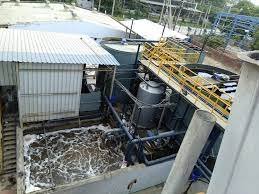Effluent Treatment Plant Operator-Food Processing Facility

Introduction:
In the realm of food processing, where hygiene and safety are paramount, the efficient treatment of effluent is a critical aspect often overlooked by consumers. However, behind the scenes, Effluent Treatment Plant (ETP) operators play a vital role in ensuring that food processing facilities adhere to stringent environmental regulations while maintaining operational efficiency. In this article, we delve into the responsibilities, challenges, and significance of ETP operators in food processing facilities.
Responsibilities of an ETP Operator:
The primary responsibility of an ETP operator in a food processing facility is to oversee the treatment and disposal of wastewater generated during various manufacturing processes. This involves the operation and maintenance of specialized equipment such as sedimentation tanks, filtration systems, biological reactors, and chemical dosing units.
- Monitoring: ETP operators are tasked with continuously monitoring the quality and quantity of effluent produced by the facility. This includes regular testing for parameters such as pH, biochemical oxygen demand (BOD), chemical oxygen demand (COD), suspended solids, and other contaminants.
- Process Optimization: ETP operators must optimize treatment processes to ensure compliance with regulatory standards and minimize environmental impact. This may involve adjusting chemical dosages, controlling flow rates, and implementing operational changes to enhance treatment efficiency.
- Maintenance: Regular maintenance of ETP equipment is essential to prevent breakdowns and ensure uninterrupted operation. ETP operators are responsible for conducting routine inspections, troubleshooting mechanical issues, and coordinating repairs as necessary.
- Compliance: Compliance with local environmental regulations is a top priority for food processing facilities. ETP operators must stay abreast of regulatory requirements and ensure that effluent discharge meets prescribed standards. This often involves maintaining detailed records of wastewater treatment activities and reporting to regulatory authorities as required.
Challenges Faced by ETP Operators:
Operating an ETP in a food processing facility presents numerous challenges, ranging from technical complexities to regulatory scrutiny.
- Variability of Wastewater Composition: The composition of wastewater in food processing facilities can vary significantly depending on the products being manufactured and the production processes involved. ETP operators must adapt treatment strategies to handle fluctuations in organic load, nutrient content, and contaminant levels.
- Treatment Efficiency: Achieving adequate treatment efficiency while minimizing operational costs can be challenging. ETP operators must strike a balance between meeting regulatory requirements and optimizing resource utilization to ensure the sustainability of wastewater management practices.
- Seasonal Variation: Seasonal fluctuations in production levels can pose challenges for ETP operators, as wastewater volumes and characteristics may change accordingly. Anticipating and managing these variations require careful planning and proactive measures to maintain treatment effectiveness.
- Regulatory Compliance: Compliance with environmental regulations is non-negotiable for food processing facilities. ETP operators face constant pressure to ensure that effluent discharge meets regulatory standards, which may require continuous process optimization and investment in advanced treatment technologies.
Significance of ETP Operators in Food Processing Facilities:
Despite operating behind the scenes, ETP operators play a crucial role in safeguarding the environment and public health while supporting the sustainable growth of the food processing industry.
- Environmental Protection: Effective wastewater treatment is essential for protecting natural water bodies and ecosystems from pollution. By removing harmful contaminants and reducing nutrient loads, ETP operators help mitigate the impact of food processing activities on the environment.
- Public Health and Safety: Proper treatment of wastewater is essential for safeguarding public health and preventing the spread of waterborne diseases. ETP operators ensure that discharged effluent poses no harm to downstream users or communities.
- Regulatory Compliance: Compliance with environmental regulations is a legal requirement for food processing facilities. ETP operators ensure that facilities adhere to prescribed standards and mitigate the risk of regulatory violations, which could result in fines or legal sanctions.
- Reputation Management: Environmental stewardship is increasingly important for businesses seeking to maintain their reputation and brand integrity. By demonstrating a commitment to responsible wastewater management, food processing facilities can enhance their credibility and appeal to environmentally conscious consumers.

Conclusion:
Effluent Treatment Plant operators are unsung heroes in the realm of food processing, working diligently to ensure that wastewater generated by manufacturing activities is treated effectively and responsibly. Their efforts not only protect the environment and public health but also contribute to the long-term sustainability of the food processing industry. As regulatory scrutiny and consumer expectations continue to evolve, the role of ETP operators will remain indispensable in maintaining the balance between economic viability and environmental responsibility within food processing facilities.
Through their expertise, dedication, and innovation, ETP operators embody the spirit of environmental stewardship, making invaluable contributions to a healthier and more sustainable future for all.



